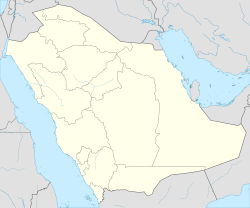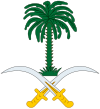
The economy of Saudi Arabia is one of the top twenty economies in the world, and the largest economy in the Arab world and the Middle East. Saudi Arabia is part of the G20 group of countries.

The Arabian Peninsula is a peninsula of Western Asia, situated northeast of Africa on the Arabian Plate. The Peninsula, plus Bahrain, the Socotra Archipelago and other nearby islands form a geopolitical region called Arabia, which is the biggest region in the world without any river.

Riyadh is the capital city and seat of government of the Riyadh Province and the Kingdom of Saudi Arabia, the largest city on the Arabian Peninsula and a governorate in the Riyadh Province. Located in the center of the an-Nafud desert, on the eastern part of the Najd plateau, the city sits at an average of 600 metres (2,000 ft) above sea level, and receives more than 16 million tourists each year, making it the 2nd most visited city in the Arab world. Riyadh had a population of 7.6 million people in 2019, making it the most populous city in Saudi Arabia, 2nd most populous city in the Arab world, and the 38th most populous in Asia.

Wahhabism is an Islamic doctrine and religious movement founded by Muhammad ibn Abd al-Wahhab. It has been variously described as "ultraconservative", "far-right" "austere", "fundamentalist", or "puritan(ical)"; as an Islamic "reform movement" to restore "pure monotheistic worship" (tawhid) by devotees; and as a "deviant sectarian movement", "vile sect" and a distortion of Islam by its detractors. The term Wahhabi(sm) is often used polemically and adherents commonly reject its use, preferring to be called Salafi or muwahhid, claiming to emphasize the principle of tawhid or monotheism, dismissing other Muslims as practising shirk (idolatry). It follows the theology of Ibn Taymiyyah and the Hanbali school of jurisprudence, although a small minority of Hanbali leaders renounced ibn Abd al-Wahhab's views due to Ottoman influence.

Saudi Aramco, officially the Saudi Arabian Oil Company, is a Saudi Arabian multinational petroleum and natural gas company based in Dhahran, Saudi Arabia.

Saudi Arabia, officially the Kingdom of Saudi Arabia, is a country in Western Asia constituting the bulk of the Arabian Peninsula. With a land area of approximately 2,150,000 km2 (830,000 sq mi), Saudi Arabia is geographically the largest sovereign state in Western Asia, the second-largest in the Arab world, the fifth-largest in Asia, and the 12th-largest in the world. Saudi Arabia is bordered by Jordan and Iraq to the north, Kuwait to the northeast, Qatar, Bahrain, and the United Arab Emirates to the east, Oman to the southeast and Yemen to the south; it is separated from Egypt and Israel by the Gulf of Aqaba. It is the only country with both a Red Sea coast and a Persian Gulf coast, and most of its terrain consists of arid desert, lowland and mountains. As of October 2018, the Saudi economy was the largest in the Middle East and the 18th largest in the world. Saudi Arabia also has one of the world's youngest populations: 50 percent of its 33.4 million people are under 25 years old.

The flag of the Kingdom of Saudi Arabia is the flag used by the government of Saudi Arabia since 15 March 1973. It is a green flag featuring in white an Arabic inscription and a sword. The inscription is the Islamic creed, or shahada: "There is no god but Allah; Muhammad is the Messenger of Allah".

The House of Saud is the ruling royal family of Saudi Arabia. It is composed of the descendants of Muhammad bin Saud, founder of the Emirate of Diriyah, known as the First Saudi state (1744–1818), and his brothers, though the ruling faction of the family is primarily led by the descendants of Ibn Saud, the modern founder of Saudi Arabia. The most influential position of the royal family is the King of Saudi Arabia. The family in total is estimated to comprise some 15,000 members, however the majority of power, influence and wealth is possessed by a group of about 2,000 of them.
The Saudi Arabia national football team represents Saudi Arabia in men's international football and The team's colours are green and white. Saudi Arabia are known as Al-Suqour and Al-Akhdhar, The team represents both FIFA and Asian Football Confederation (AFC).

Salman bin Abdulaziz Al Saud has been the King of Saudi Arabia and Custodian of the Two Holy Mosques since 23 January 2015.
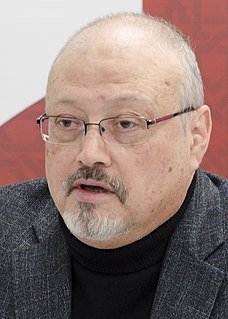
Jamal Ahmad Khashoggi was a Saudi Arabian dissident, author, columnist for The Washington Post, and a general manager and editor-in-chief of Al-Arab News Channel who was assassinated at the Saudi consulate in Istanbul on 2 October 2018 by agents of the Saudi government. He also served as editor for the Saudi Arabian newspaper Al Watan, turning it into a platform for Saudi progressives.

Articles related to Saudi Arabia include:
Capital punishment is a legal penalty in Saudi Arabia. The country performed at least 158 executions in 2015, at least 154 in 2016, at least 146 in 2017, at least 149 in 2018, with possibly 184 executed in 2019.

The following outline is provided as an overview of and topical guide to Saudi Arabia:

Abdullah bin Abdulaziz Al Saud was King of Saudi Arabia and Custodian of the Two Holy Mosques from the death of his half-brother, King Fahd, on 1 August 2005 until his own death in 2015.

The King of Saudi Arabia is Saudi Arabia's absolute monarch who serves as head of state and head of government. He is the head of the Saudi royal family, the House of Saud. The King is called the "Custodian of the Two Holy Mosques", a title that signifies Saudi Arabia's jurisdiction over the mosques of Masjid al Haram in Mecca and Al-Masjid an-Nabawi in Medina, and replaced "His Majesty" in 1986.
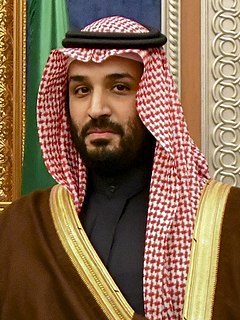
Mohammed bin Salman bin Abdulaziz al-Saud, colloquially known as MBS, is the Crown Prince of Saudi Arabia. He is currently serving as the country's deputy prime minister and is also Chairman of the Council for Economic and Development Affairs, Chairman of the Council of Political and Security Affairs, and Minister of Defence – the world's youngest at the time of his appointment. He has been described as the power behind the throne of his father, King Salman. He was appointed crown prince in June 2017 following King Salman's decision to remove Muhammad bin Nayef from all positions, making Mohammed bin Salman heir-designate to the throne.
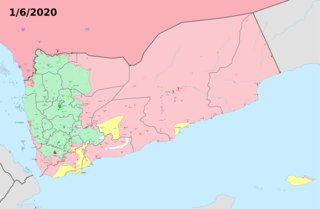
The Saudi-led intervention in Yemen, also called the Arab coalition, is an intervention launched by Saudi Arabia in 2015, leading a coalition of nine countries from West Asia and North Africa, in response to calls from the internationally recognized pro-Saudi president of Yemen Abdrabbuh Mansur Hadi for military support after he was ousted by the Houthi movement due to economic and political grievances, and fled to Saudi Arabia.
WWE, an American professional wrestling promotion based in Stamford, Connecticut, United States, has been promoting events in Saudi Arabia since 2014. In contrast to regular WWE events, female wrestlers were banned from appearing in events held in Saudi Arabia until 2019.

The COVID-19 pandemic in Saudi Arabia is part of the worldwide pandemic of coronavirus disease 2019 caused by severe acute respiratory syndrome coronavirus 2. On 2 March 2020, the Ministry of Health confirmed the first case in Saudi Arabia. By 8 April, as many as 150 members of the Saudi royal family had tested positive including the king's nephew, Faisal bin Bandar Al Saud, who has been put in the ICU of an elite hospital over coronavirus complications.
